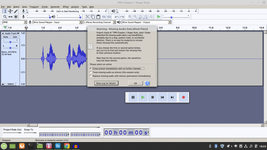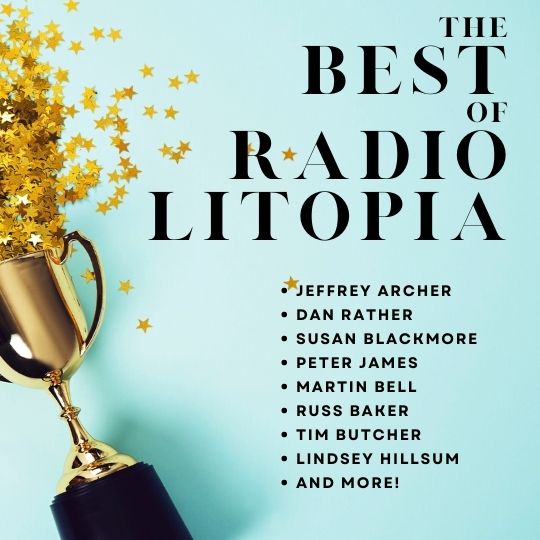Paul Whybrow
Full Member
Maya Angelou said:
“Words mean more than what is set down on paper. It takes the human voice to infuse them with the shades of deeper meaning.”
She’s right, but I’m damned sure that she never mastered her recordings of her books.
I’ve previously mentioned what sound equipment I bought. After several weeks of narrating, I purchased what’s called a pop screen

My Røde microphone has a built-in pop screen, but I found that I have massive plosives (makes for a lousy pick-up line!) which intruded on the recording when I said words such as “Tart”. The accessory pop screen mutes these peaks.
Narrating and mastering the recordings of 50 chapters of an 80,000-word novel was massively time-consuming. It makes editing the manuscript feel like a picnic in the park. It took me five months to write Who Kills A Nudist? Another month to edit the story. Turning it into an audiobook has taken 14 weeks, so far, as I'm sure that I'll hear things that still need correcting when I listen to it.
I estimate that I’ve devoted 900 hours to narrating and mastering since April as I’ve put in eight to sixteen-hour days. I haven’t done any creative writing in that time.
If you're thinking of doing an audiobook set aside several months. It would be possible to rush the job, but it’s likely that Audible’s ACX check would reject your submission. Reading aloud is something many of us do if we have children or a loving partner, but narrating is different, requiring voice acting and pauses for emphasis and varying the pace depending on what’s happening in a scene. This is a job that takes the time it takes.
I’m glad to have turned my first crime novel into an audiobook, but, believe me, my happiness is more a sense of relief from having completed the task, rather than pride at what I’ve done. Returning to mastering each day felt like cleaning the grouting of an Olympics-sized swimming pool armed with a toothbrush. Trapped in an endless task, the only way out was through.
Trapped in an endless task, the only way out was through.
How I did it
* I set my portable recording booth atop a box on a bedside table to bring it to a level with my mouth. The microphone is connected to my laptop by the USB port. The lead is 78”/198 cm long, so it would be possible to position it away from the mic (to avoid fan noise) though that would be a stretch to operate the Audacity controls.
* Each chapter is treated as a separate sound file by ACX. I used this stipulation as a way of noting recording errors on each chapter text with a different colour. If I repeatedly stumbled over a particular word or phrase, I increased the font size.
* To minimise the chance of extraneous noises, I read from a tablet. Reading from rustling paper would be impossible, I’d imagine, as the microphone picks up on everything.
Recommendations
* Clear your tubes out! I used Olbas Oil, Fisherman’s Friends lozenges and some Jakemans’ menthol sweets. I bought a box of the much-praised Vocalzone pastilles, but they weren’t superior and were three-times the price.
* Have water to drink nearby. Sometimes you’ll struggle with an excess of saliva, but mostly your voice will start to sound like a lizard crossing the Gobi Desert! You can pause the recording while taking on lubrication.
* Wear clothing that doesn’t rustle. This doesn’t affect me in my sweltering rooftop flat, as I become the Nude Novelist in summer, now the Nude Narrator!
* Limit what you do...tackle the work in manageable stages or you’ll quickly hate what you’re doing. This will happen anyway. but, especially when starting out take it easy on your voice. My throat felt like I’d shoved a red-hot poker down it after early recording sessions.
but, especially when starting out take it easy on your voice. My throat felt like I’d shoved a red-hot poker down it after early recording sessions.
Odd things
* The sound of your voice will bewilder you. You’ll hate it at times, though sometimes you’ll forget it’s you talking and think that your narration works very well indeed. Remember, narrating your book is part of the process of selling yourself. Some audiobook fans are drawn towards novels told by their creators.
* Narrating your book is the best way of noticing mistakes that you’ve previously missed in editing. It makes you feel like a fool. I’d edited Who Kills A Nudist? One hundred times (I kept count) and it has been enjoyed by three beta readers. Despite this, while listening to it, I found I’d misnamed the dead nudist at one point, and in another chapter I’d sent a detective to two different places eighty miles apart!
* No one much will care that you’ve created an audiobook, although it will haunt your waking and sleeping thoughts.
* Many times, I cursed myself for writing such long sentences, as I ran out of breath yet again.
* Writing 500-word children’s books suddenly looks attractive to me
Noises Off
Narrating and recording a book soon makes you obsessed with noise. I live in a noisy location, at a petrol station on a main road, next to the flight path to Newquay Airport and with a car repair workshop nearby. The lockdown was a blessing for me when I started recording. Since restrictions have eased, I’ve been reminded of how intrusive slamming car doors, exhaust notes and aeroplanes are. I love motorcycles, but waiting for wailing two-stroke exhaust noise to cease, as it passes through three sentences, tried my patience.
They are the noisy noises, but my sensitive mic hears things I’m unaware of while narrating, as I have earbuds in to hear my voice. Thus, when listening back, I hear:
* Knees knocking on the bedside table supporting the recording booth.
* Strange booming from brushing the mic lead with my arm.
* Breathing! As @Rich. said, most sounds that need removing are your breathing. On the Audacity soundwave they appear as tiny vertical ‘bristles’ or little squiggles or mini sausages on the horizontal baseline. It takes many hours to delete them. Some barely make a noise, but others sound like the gasp of a drowning man!
* Rather than reach a point where I’m running out of breath and my voice is croaking, I pause and take a lungful of air, pausing before narrating again. The deep breath can be edited out.
* You’ll find that some of the tiny marks on the soundwave aren’t breaths, but the very end of words. Audacity has a scroll back feature which replaces them.
I was puzzled by a charming tinkling sound, as if a silver carriage full of fairies was passing by. It occurred a few times, increasing in intensity. It wasn’t until I stopped recording, that I heard the sparrow fledglings cheeping in the wall space, as they begged for food.
With soundproofing, I think my portable recording booth is the way to go. It was affordable and does most of what a full-sized cubicle would do. That would be pricey to construct and take up a lot of space. It wouldn’t be any more protection from exhaust notes.
Tips
* If a scene has several characters use different coloured colours to delineate who’s speaking.
* I’ve seen it recommended that breathing points are marked on the manuscript, but I don’t know how that would work, as you’d have to be robotic to achieve it. NB unwanted breathing noises can be removed from the recording...you don’t have to go back to the beginning and do it all again!
* The best way of correcting mistakes is to re-record them. You might think, that as you’re still you and that your recording equipment is identical and in the same room, that you’ll sound exactly the same. It’s probable that you won’t be a precise match. Instead, you’ll sound like your younger brother or someone who could be your cousin.
* The worst thing to do is what I wasted several weeks doing: that is, to re-record snippets, a sentence or phrase. It makes the recording sound uneven. One paragraph I corrected sounded like four people were narrating it! Far better a technique, in the long run, is to re-record the entire paragraph. This cushions your slightly different-sounding voice.
*Sounds obvious, but you’re going to be dealing with lots and lots of manuscript files and sound files, so label them in the same layout, so they stay in order.
Videos
* There are thousands of helpful and dreadful advice videos on YouTube. Whatever you watch to do with Audacity and Audible make sure it’s relatively new and applicable to your version. The same goes for articles and forums
Here are some of the better ones that helped me:
~ See last half of : (from 15.30 minutes)
~
~
~ Standard chain settings for ACX production - Audacity Forum
~ AudioBook Mastering version 4 - Audacity Forum
~
~
~ Booth Junkie videos
I’ve yet to listen to the ultimate version of my first audiobook. I did five editing sweeps through the whole thing, improving it each time. Sound interference I’d previously left in as barely noticeable, I removed as I became more critical. This task would be ideal for someone with OCD!
One thing that surprised me, was how long my audiobook is. Reading it silently to myself takes five and a half hours. Totalling the fifty chapter sound files makes for eight hours and twenty minutes.
The next task is to scrutinise the ACX requirements and upload my talking book to Audible. I’m not expecting a leap in sales, but it may help to spread my name as an author. Writing is a terrible way of making money. If I’ve devoted 900 hours to the audiobook and I charge £20 or £15 for it...my hourly income is laughable.
I am dreading turning Book 2 The Perfect Murderer into an audiobook, as it’s 139,000 words long! I may join the French Foreign Legion instead.
If anyone needs any advice, give me a shout and I’ll see if I can remember what I did.

“Words mean more than what is set down on paper. It takes the human voice to infuse them with the shades of deeper meaning.”
She’s right, but I’m damned sure that she never mastered her recordings of her books.
I’ve previously mentioned what sound equipment I bought. After several weeks of narrating, I purchased what’s called a pop screen

My Røde microphone has a built-in pop screen, but I found that I have massive plosives (makes for a lousy pick-up line!) which intruded on the recording when I said words such as “Tart”. The accessory pop screen mutes these peaks.
Narrating and mastering the recordings of 50 chapters of an 80,000-word novel was massively time-consuming. It makes editing the manuscript feel like a picnic in the park. It took me five months to write Who Kills A Nudist? Another month to edit the story. Turning it into an audiobook has taken 14 weeks, so far, as I'm sure that I'll hear things that still need correcting when I listen to it.
I estimate that I’ve devoted 900 hours to narrating and mastering since April as I’ve put in eight to sixteen-hour days. I haven’t done any creative writing in that time.
If you're thinking of doing an audiobook set aside several months. It would be possible to rush the job, but it’s likely that Audible’s ACX check would reject your submission. Reading aloud is something many of us do if we have children or a loving partner, but narrating is different, requiring voice acting and pauses for emphasis and varying the pace depending on what’s happening in a scene. This is a job that takes the time it takes.
I’m glad to have turned my first crime novel into an audiobook, but, believe me, my happiness is more a sense of relief from having completed the task, rather than pride at what I’ve done. Returning to mastering each day felt like cleaning the grouting of an Olympics-sized swimming pool armed with a toothbrush.
How I did it
* I set my portable recording booth atop a box on a bedside table to bring it to a level with my mouth. The microphone is connected to my laptop by the USB port. The lead is 78”/198 cm long, so it would be possible to position it away from the mic (to avoid fan noise) though that would be a stretch to operate the Audacity controls.
* Each chapter is treated as a separate sound file by ACX. I used this stipulation as a way of noting recording errors on each chapter text with a different colour. If I repeatedly stumbled over a particular word or phrase, I increased the font size.
* To minimise the chance of extraneous noises, I read from a tablet. Reading from rustling paper would be impossible, I’d imagine, as the microphone picks up on everything.
Recommendations
* Clear your tubes out! I used Olbas Oil, Fisherman’s Friends lozenges and some Jakemans’ menthol sweets. I bought a box of the much-praised Vocalzone pastilles, but they weren’t superior and were three-times the price.
* Have water to drink nearby. Sometimes you’ll struggle with an excess of saliva, but mostly your voice will start to sound like a lizard crossing the Gobi Desert! You can pause the recording while taking on lubrication.
* Wear clothing that doesn’t rustle. This doesn’t affect me in my sweltering rooftop flat, as I become the Nude Novelist in summer, now the Nude Narrator!
* Limit what you do...tackle the work in manageable stages or you’ll quickly hate what you’re doing. This will happen anyway.
Odd things
* The sound of your voice will bewilder you. You’ll hate it at times, though sometimes you’ll forget it’s you talking and think that your narration works very well indeed. Remember, narrating your book is part of the process of selling yourself. Some audiobook fans are drawn towards novels told by their creators.
* Narrating your book is the best way of noticing mistakes that you’ve previously missed in editing. It makes you feel like a fool. I’d edited Who Kills A Nudist? One hundred times (I kept count) and it has been enjoyed by three beta readers. Despite this, while listening to it, I found I’d misnamed the dead nudist at one point, and in another chapter I’d sent a detective to two different places eighty miles apart!
* No one much will care that you’ve created an audiobook, although it will haunt your waking and sleeping thoughts.
* Many times, I cursed myself for writing such long sentences, as I ran out of breath yet again.
* Writing 500-word children’s books suddenly looks attractive to me
Noises Off
Narrating and recording a book soon makes you obsessed with noise. I live in a noisy location, at a petrol station on a main road, next to the flight path to Newquay Airport and with a car repair workshop nearby. The lockdown was a blessing for me when I started recording. Since restrictions have eased, I’ve been reminded of how intrusive slamming car doors, exhaust notes and aeroplanes are. I love motorcycles, but waiting for wailing two-stroke exhaust noise to cease, as it passes through three sentences, tried my patience.
They are the noisy noises, but my sensitive mic hears things I’m unaware of while narrating, as I have earbuds in to hear my voice. Thus, when listening back, I hear:
* Knees knocking on the bedside table supporting the recording booth.
* Strange booming from brushing the mic lead with my arm.
* Breathing! As @Rich. said, most sounds that need removing are your breathing. On the Audacity soundwave they appear as tiny vertical ‘bristles’ or little squiggles or mini sausages on the horizontal baseline. It takes many hours to delete them. Some barely make a noise, but others sound like the gasp of a drowning man!
* Rather than reach a point where I’m running out of breath and my voice is croaking, I pause and take a lungful of air, pausing before narrating again. The deep breath can be edited out.
* You’ll find that some of the tiny marks on the soundwave aren’t breaths, but the very end of words. Audacity has a scroll back feature which replaces them.
I was puzzled by a charming tinkling sound, as if a silver carriage full of fairies was passing by. It occurred a few times, increasing in intensity. It wasn’t until I stopped recording, that I heard the sparrow fledglings cheeping in the wall space, as they begged for food.
With soundproofing, I think my portable recording booth is the way to go. It was affordable and does most of what a full-sized cubicle would do. That would be pricey to construct and take up a lot of space. It wouldn’t be any more protection from exhaust notes.
Tips
* If a scene has several characters use different coloured colours to delineate who’s speaking.
* I’ve seen it recommended that breathing points are marked on the manuscript, but I don’t know how that would work, as you’d have to be robotic to achieve it. NB unwanted breathing noises can be removed from the recording...you don’t have to go back to the beginning and do it all again!
* The best way of correcting mistakes is to re-record them. You might think, that as you’re still you and that your recording equipment is identical and in the same room, that you’ll sound exactly the same. It’s probable that you won’t be a precise match. Instead, you’ll sound like your younger brother or someone who could be your cousin.
* The worst thing to do is what I wasted several weeks doing: that is, to re-record snippets, a sentence or phrase. It makes the recording sound uneven. One paragraph I corrected sounded like four people were narrating it! Far better a technique, in the long run, is to re-record the entire paragraph. This cushions your slightly different-sounding voice.
*Sounds obvious, but you’re going to be dealing with lots and lots of manuscript files and sound files, so label them in the same layout, so they stay in order.
Videos
* There are thousands of helpful and dreadful advice videos on YouTube. Whatever you watch to do with Audacity and Audible make sure it’s relatively new and applicable to your version. The same goes for articles and forums
Here are some of the better ones that helped me:
~ See last half of : (from 15.30 minutes)
~
~
~ Standard chain settings for ACX production - Audacity Forum
~ AudioBook Mastering version 4 - Audacity Forum
~
~
~ Booth Junkie videos
I’ve yet to listen to the ultimate version of my first audiobook. I did five editing sweeps through the whole thing, improving it each time. Sound interference I’d previously left in as barely noticeable, I removed as I became more critical. This task would be ideal for someone with OCD!
One thing that surprised me, was how long my audiobook is. Reading it silently to myself takes five and a half hours. Totalling the fifty chapter sound files makes for eight hours and twenty minutes.
The next task is to scrutinise the ACX requirements and upload my talking book to Audible. I’m not expecting a leap in sales, but it may help to spread my name as an author. Writing is a terrible way of making money. If I’ve devoted 900 hours to the audiobook and I charge £20 or £15 for it...my hourly income is laughable.
I am dreading turning Book 2 The Perfect Murderer into an audiobook, as it’s 139,000 words long! I may join the French Foreign Legion instead.

If anyone needs any advice, give me a shout and I’ll see if I can remember what I did.


 There's an app to calm the hissing caused by an excess of the letter S. It's called a 'de-esser' and has been around since 2014. The inventor Paul L also made a 'de-clicker' to remove the many irritating clicks that appear on a recording from movement and lip smacking by the narrator.
There's an app to calm the hissing caused by an excess of the letter S. It's called a 'de-esser' and has been around since 2014. The inventor Paul L also made a 'de-clicker' to remove the many irritating clicks that appear on a recording from movement and lip smacking by the narrator.











